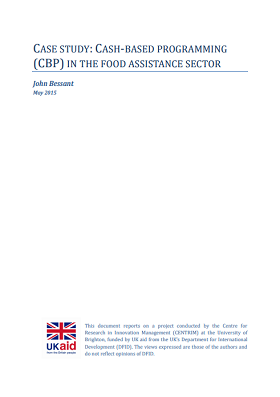Report
Case Study:Cash-based programming in the food assistance sector
The purpose of this case study is to explore the pattern of innovation in the food supply and distribution area (i.e. not concerned with nutrition).
The case raises some key policy issues:
- How to foster entrepreneurship and create enabling conditions for small-scale experiments and prototypes? How can new approaches (‘lean start-up’ and other ‘agile’ innovation methodologies) be rapidly deployed?
- How to finance high risk start-up ventures of this kind? And how to fund the next ‘capital round’ of development finance to scale these pilots?
- How to evaluate in light touch manner to ensure prototypes and learning can take place?
- How to deal with the adoption/diffusion challenge (particularly the missing middle in innovation) and improve mechanisms for crossing the chasm?
- How to work more effectively in an open innovation context – the challenge of finding, forming, performing with new networks bringing in very different players?
- How to build ambidexterity into mainstream ecosystem players such that experiments and exploration at the periphery can be amplified.
It concludes with some recommendations to help configure the HI system to enable this including:
- Provision of support for developing and retraining entrepreneurial talent across the sector.
- Provide identifiable sources of sufficient venture capital to enable experimentation to pilot/prototype.
- Review and promote awareness of range of options around building internal entrepreneurship capability in HI.
- Review and transfer models for structures for ‘corporate entrepreneurship’ from other sectors to HI.



